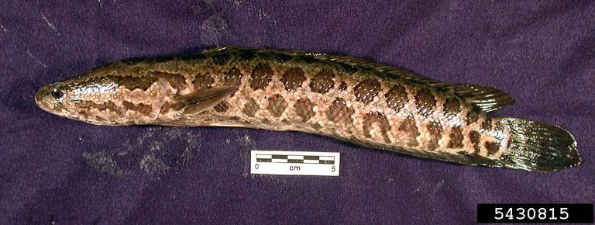



Photographer: Unknown Affiliation: U.S. Geological Survey Archive Source: Bugwood.org Copyright: (CC BY-NC 3.0)
The Snakehead look very similar to our native bowfin. Similar traits between the Snakehead and the native bowfin are long cylindrical shape, long dorsal fin and rounded tail fin. However, the Snakehead has a very long anal fin that starts half way down the body, a pelvic fin that is located close to its head, and enlarged scales on the head much like a snake. They also have a large mouth with several sharp, canine-like teeth on the lower jaw. The northern snakehead can reach a maximum length of over 80 cm (31.5 in.) and weight of 7 kg (15.4 lbs).
All snakeheads are aggressive predators and may eliminate other fishes in waters they invade. They have even been known to bite humans who approach a guarded nest. No snakeheads have been found in Texas waters to date, but the threat exists. Because of the damage that can occur when they are inadvertently released into lakes and streams, all species of snakeheads are prohibited in Texas. It is illegal in this state to release into public waters, import, sell, purchase, transport, propagate, or possess any living snakehead, except under special permits issued by TPWD. Dead snakeheads (intestines removed) may be legally imported and sold.
C. argus can breathe with gills and a lung-like organ that in fact requires them to breathe (or gulp) air at the water's surface. This allows them to survive in water that has low oxygen levels and even survive out of water for several days if they're kept moist. Some species of snakehead can live for long periods of time burrowed in mud, and can travel over land to invade new bodies of water. Northern snakeheads can survive in temperatures ranging from 0 to 30° C. This makes the northern snakeheads of most concern because of its ability to survive in cold temperatures enabling its survival in much of North America once it becomes established. It reaches sexual maturity in 2 to 3 years where females release 1,300 to 15,000 eggs per spawn (in the summer), which can occur 1 to 5 times per year. The adults build a floating nest for the eggs and aggressively protect their nests from predators.
C. argus have been imported to North America for the aquarium trade, and may be sold live in Asian-style fish markets
Africa and southern Asia
U.S. Present: Currently four species of snakehead has been recorded in open waters in California, Florida, Hawaii, Maine, Massachusetts, Rhode Island and Maryland. Reports of northern Snakehead have been limited to California, Florida, and Maryland.
U.S. Habitat: Northern snakeheads prefer stagnant shallow ponds or swamps with mud substrate and vegetation. They can also be found in slow muddy streams, canals, reservoirs, lakes, and rivers.
Bowfin (Amia calva)
Taking preventative measures to not transport C. argus to non-infested water basins.
SEARCH Online
Google Search: Channa argus
Google Images: Channa argus
NatureServe Explorer: Channa argus
Bugwood Network Images: Channa argus
Orell, Thomas, and Lee Weight. "The Northern Snakehead Channa argus (Anabantomorpha: Channidae), a non-indigenous fish species in the Potomac River, U.S.A." Biological Society of Washington. 118.2 (2005): 407-415. Web. 7 Sep. 2011.
Jiao, Yan, Nicolas Lapointe, Paul Angermeier, and Brian Murphy. "Hierarchical demographic approaches for assessing invasion dynamics of non-indigenous species: An example using northern snakehead (Channa argus)." Ecological Modeling. 220.13-14 (2009): 1681-1689. Web. 7 Sep. 2011.
Internet Sources
FishBase.org. 2010. Channa argus argus. Accessed 17 Nov. 2010: http://fishbase.org/Summary/SpeciesSummary.
Northern Snakehead Working Group. National Control and Management Plan for the Northern Snakehead (Channa argus): Draft. Submitted to the Department of the Interior. Accessed 17 Nov. 2010: http://www.fws.gov/northeast/marylandfisheries/reports.
Ontario Federation of Anglers and Hunters. 2010. Northern Snakehead. Accessed 17 Nov. 2010: http://www.invadingspecies.com/Invaders.